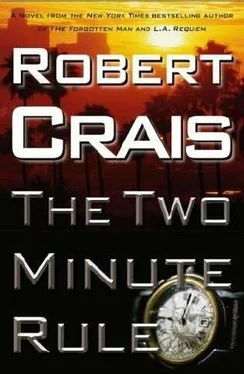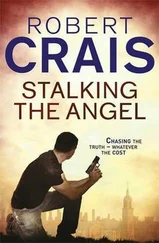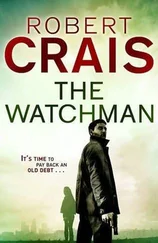A tip from the Feeb.
Pollard went to her bedroom and dragged a chair into her closet. She pulled the box from her high shelf, the highest shelf where the boys couldn’t reach, and took down her gun.
Pollard knew she might have made a grave and serious mistake. Marki told them Whitt was a registered informant with a cop taking care of her, but “cop” didn’t necessarily mean a policeman and LAPD wasn’t the only law enforcement agency using registered informants. Sheriffs, Secret Service agents, U.S. Marshals, and ATF agents all thought of themselves as cops, and all of them employed registered informants.
Alison Whitt could have been an informant for the FBI. And if she had-
The fifth man was an FBI agent.
Pollard hurried out into the heat and drove into Westwood.
REGISTERED INFORMANTS could be and often were integral in solving crimes and obtaining indictments. The information they provided and their methods of obtaining it were included as part of the legal record in investigators’ reports, writs, warrants, grand jury indictments, motions, briefs, and ultimately trials. The true names of informants were never used, as many of these documents were in the public record. In all such documents, the informant’s name was replaced by a number. This number was the informant’s code number, and the codes-along with investigators’ reports regarding the informant’s reliability and pay vouchers when informants were paid for their information-were held under lock and key to protect the anonymity of the informants. Where and how this list was safeguarded varied by agency, but no one was guarding nuclear launch codes; all an agent had to do was ask his boss for the key.
Pollard had used informants only four times during her three years on the Squad. On each of those four occasions she had requested the Bank Squad’s informant list from Leeds and watched him open a locked file cabinet in which he stored the papers. Each time, he used a brass key taken from a small box he kept in his upper right-hand desk drawer. Pollard didn’t know if the box and the key and the file would be in their same places after eight years, but Sanders would know.
The sky over Westwood was a brilliant clear blue when Pollard rolled into the parking lot. It was eight minutes after two. The black tower shimmered against the sky; an optical trick played by the sun.
Pollard studied the tower. She tried telling herself this was the one-in-a-million chance when a coincidence was just a coincidence, but she didn’t believe it. Alison Whitt’s name was going to be on a form in Leeds’ office. The agent who recruited and used her was almost certainly responsible for murdering six people. That agent might be anyone.
Pollard finally opened her phone to call Sanders. She needed a pass into the building, but Sanders did not answer. Her voice mail picked up on the first ring, indicating Sanders was probably at a crime scene interviewing fresh victims.
Pollard cursed her bad luck, then dialed the Squad’s general number and waited as it rang. On days when the Squad was spread throughout L.A., a duty agent remained in the office to field incoming calls and attend to his or her paperwork. Whenever Pollard had been the duty agent she usually ignored the calls.
“Bank Squad. Agent Delaney.”
Pollard remembered the young agent she met with Bill Cecil. New guys always answered because they weren’t yet jaded.
“This is Katherine Pollard. I met you up in the office with the donuts, remember?”
“Oh, sure. Hi.”
“I’m downstairs. Is April up there?”
Pollard knew Sanders wasn’t in the office, but asking about Sanders was a setup for asking about Leeds. She had to find out if Leeds was in his office because Leeds controlled the list. Pollard wanted Leeds gone.
Delaney said, “I haven’t seen her. I’m pretty much alone here. Everyone’s out on a call.”
“How about Leeds?”
“Um, he was here earlier-no, I don’t see him. It’s pretty busy today.”
Pollard was relieved, but tried to sound disappointed.
“Damn. Kev, listen-I have some things for Leeds I wanted to drop off along with a box of donuts for the Squad. Would you send down a badge?”
“Sure. No problem.”
“Great. I’ll see you in a minute.”
Pollard had picked up a box of donuts from Stan’s to justify her visit to the office. She tucked her gun under the seat, then carried the donuts and her file into the building. She brought the file so she would have an excuse to enter Leeds’ office. Pollard waited for her escort like before, then rode up to the thirteenth floor.
When she entered the squad area she scanned the room. Delaney was alone in a cubicle near the door. Pollard flashed a big smile at Delaney as she approached him.
“Man, I used to hate having the duty. I think you need a donut.”
Delaney fished a donut from the box, but seemed uncertain where to put it and had probably taken it only to be polite. His desk was covered in paperwork.
Pollard said, “You want me to leave the box with you?”
Delaney glanced at his desk, noting there was no place to put it.
“Why don’t you leave it in the coffee room?”
“You bet. I’m going to drop these things in Leeds’ office, then I’ll be out of your hair.”
She gestured with the file so he would see it, then turned away. Pollard tried to move with an easy grace, as if her actions were expected and normal. She dropped off the donuts in the coffee room, then stole a glance at Delaney as she stepped back into the squad area. His head was down, busy with his work.
Pollard went to Leeds’ office. She opened the door without hesitation and entered the dragon’s lair. Pollard had not been in Leeds’ office since the day she resigned, but it was as intimidating now as she remembered. Pictures of Leeds with every president since Nixon adorned the walls, along with an inscribed portrait of J. Edgar Hoover, who Leeds revered as an American hero. An actual Wanted poster of John Dillinger hung among the presidents, presented to Leeds by President Reagan.
Pollard took in the office to get her bearings and was relieved to see the file cabinet was still in the corner and Leeds’ desk was unchanged. She hurried to the desk and opened the upper right-hand drawer. Several keys were now in the box, but Pollard recognized the brass key. Now she hurried to the cabinet, worried Delaney would start wondering why she was taking so long. She unlocked the cabinet, opened the drawer, and scanned through the file folders, which were divided alphabetically. She found the W’s, pulled out the folder, then searched through the files. Each file was labeled by the informant’s name and code number.
She was still hoping this would be the one-in-a-million coincidence when she saw the name: Alison Carrie Whitt.
Pollard opened the file to the cover sheet, which contained Alison Whitt’s identifying information. She scanned down the page, searching for the fifth man’s name-
“What in the hell are you doing?”
Pollard jerked at the sound of his voice. Leeds filled the door, his face furious.
“Pollard, stand up! Get away from those files. Delaney! Get in here!”
Pollard slowly stood, but she didn’t put down the file. Delaney appeared in the door behind Leeds. She studied them. Either of their names might be on the sheet, but she didn’t believe it would be Delaney. He was too new.
Pollard pulled herself together. She stood tall and looked Leeds in the eye.
“An agent in this office was involved in the murder of the four officers under the Fourth Street Bridge.”
Even as she said it she thought: Leeds. It could be Leeds.
He advanced toward her across the office, moving carefully.
Читать дальше












